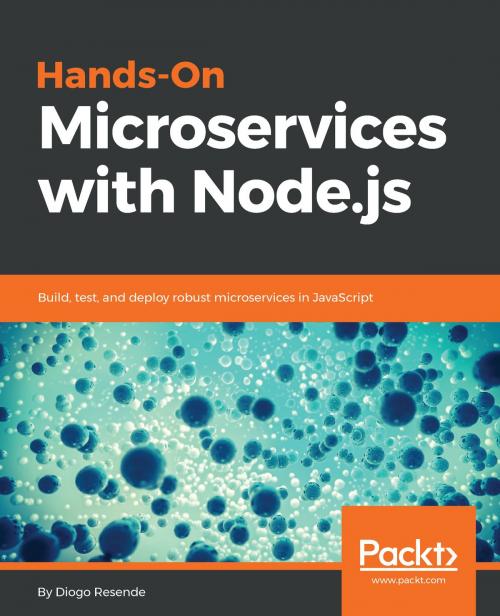Hands-On Microservices with Node.js
Build, test, and deploy robust microservices in JavaScript
Nonfiction, Computers, Programming, Programming Languages, CGI, JavaScript, Perl, VBScript, Internet, Web Development| Author: | Diogo Resende | ISBN: | 9781788626835 |
| Publisher: | Packt Publishing | Publication: | June 29, 2018 |
| Imprint: | Packt Publishing | Language: | English |
| Author: | Diogo Resende |
| ISBN: | 9781788626835 |
| Publisher: | Packt Publishing |
| Publication: | June 29, 2018 |
| Imprint: | Packt Publishing |
| Language: | English |
Learn essential microservices concepts while developing scalable applications with Express, Docker, Kubernetes, and Docker Swarm using Node 10
Key Features
- Write clean and maintainable code with JavaScript for better microservices development
- Dive into the Node.js ecosystem and build scalable microservices with Seneca, Hydra,
- and Express.js
- Develop smart, efficient, and fast enterprise-grade microservices implementation
Book Description
Microservices enable us to develop software in small pieces that work together but can be developed separately; this is one reason why enterprises have started embracing them. For the past few years, Node.js has emerged as a strong candidate for developing microservices because of its ability to increase your productivity and the performance of your applications.
Hands-On Microservices with Node.js is an end-to-end guide on how to dismantle your monolithic application and embrace the microservice architecture - right from architecting your services and modeling them to integrating them into your application. We'll develop and deploy these microservices using Docker. Scalability is an important factor to consider when adding more functionality to your application, and so we delve into various solutions, such as Docker Swarm and Kubernetes, to scale our microservices. Testing and deploying these services while scaling is a real challenge; we'll overcome this challenge by setting up deployment pipelines that break up application build processes in several stages. Later on, we'll take a look at serverless architecture for our microservices and its benefits against traditional architecture. Finally, we share best practices and several design patterns for creating efficient microservices.
What you will learn
- Learn microservice concepts
- Explore different service architectures, such as Hydra and Seneca
- Understand how to use containers and the process of testing
- Use Docker and Swarm for continuous deployment and scaling
- Learn how to geographically spread your microservices
- Deploy a cloud-native microservice to an online provider
- Keep your microservice independent of online providers
Who this book is for
This book is for JavaScript developers seeking to utilize their skills to build microservices and move away from the monolithic architecture. Prior knowledge of Node.js is assumed.
Learn essential microservices concepts while developing scalable applications with Express, Docker, Kubernetes, and Docker Swarm using Node 10
Key Features
- Write clean and maintainable code with JavaScript for better microservices development
- Dive into the Node.js ecosystem and build scalable microservices with Seneca, Hydra,
- and Express.js
- Develop smart, efficient, and fast enterprise-grade microservices implementation
Book Description
Microservices enable us to develop software in small pieces that work together but can be developed separately; this is one reason why enterprises have started embracing them. For the past few years, Node.js has emerged as a strong candidate for developing microservices because of its ability to increase your productivity and the performance of your applications.
Hands-On Microservices with Node.js is an end-to-end guide on how to dismantle your monolithic application and embrace the microservice architecture - right from architecting your services and modeling them to integrating them into your application. We'll develop and deploy these microservices using Docker. Scalability is an important factor to consider when adding more functionality to your application, and so we delve into various solutions, such as Docker Swarm and Kubernetes, to scale our microservices. Testing and deploying these services while scaling is a real challenge; we'll overcome this challenge by setting up deployment pipelines that break up application build processes in several stages. Later on, we'll take a look at serverless architecture for our microservices and its benefits against traditional architecture. Finally, we share best practices and several design patterns for creating efficient microservices.
What you will learn
- Learn microservice concepts
- Explore different service architectures, such as Hydra and Seneca
- Understand how to use containers and the process of testing
- Use Docker and Swarm for continuous deployment and scaling
- Learn how to geographically spread your microservices
- Deploy a cloud-native microservice to an online provider
- Keep your microservice independent of online providers
Who this book is for
This book is for JavaScript developers seeking to utilize their skills to build microservices and move away from the monolithic architecture. Prior knowledge of Node.js is assumed.















